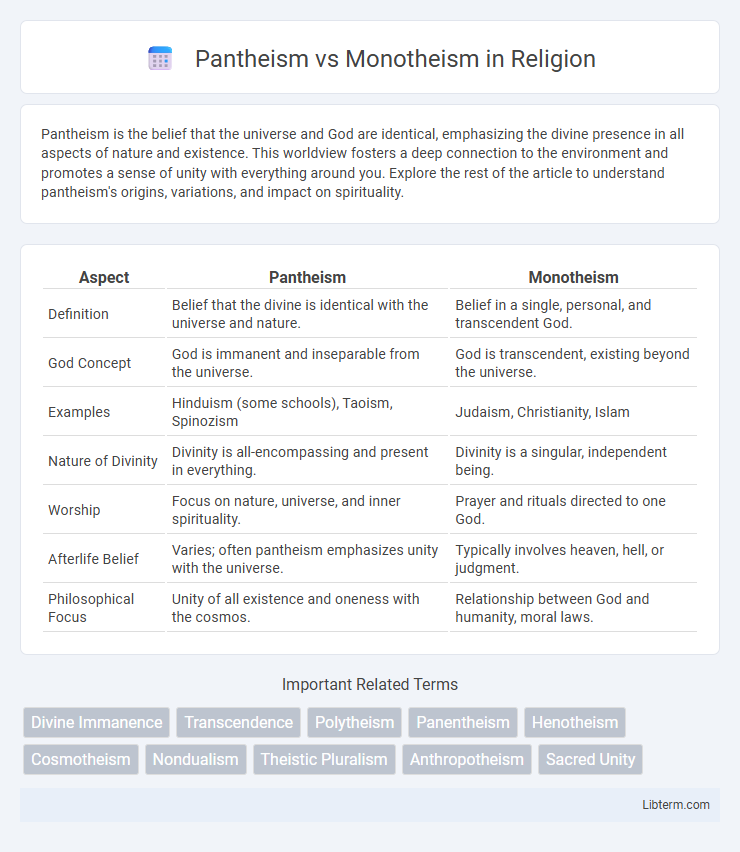Pantheism is the belief that the universe and God are identical, emphasizing the divine presence in all aspects of nature and existence. This worldview fosters a deep connection to the environment and promotes a sense of unity with everything around you. Explore the rest of the article to understand pantheism's origins, variations, and impact on spirituality.
Table of Comparison
| Aspect | Pantheism | Monotheism |
|---|---|---|
| Definition | Belief that the divine is identical with the universe and nature. | Belief in a single, personal, and transcendent God. |
| God Concept | God is immanent and inseparable from the universe. | God is transcendent, existing beyond the universe. |
| Examples | Hinduism (some schools), Taoism, Spinozism | Judaism, Christianity, Islam |
| Nature of Divinity | Divinity is all-encompassing and present in everything. | Divinity is a singular, independent being. |
| Worship | Focus on nature, universe, and inner spirituality. | Prayer and rituals directed to one God. |
| Afterlife Belief | Varies; often pantheism emphasizes unity with the universe. | Typically involves heaven, hell, or judgment. |
| Philosophical Focus | Unity of all existence and oneness with the cosmos. | Relationship between God and humanity, moral laws. |
Understanding Pantheism: A Brief Overview
Pantheism views the universe and God as identical, emphasizing the divine presence in all aspects of nature, contrasting with Monotheism's belief in a singular, personal deity distinct from creation. Pantheistic beliefs highlight interconnectedness and the sacredness of the cosmos, often rejecting a separate, anthropomorphic god. This perspective fosters spiritual reverence for the environment and the unity of existence, differing fundamentally from monotheistic doctrines rooted in a transcendent, personal God.
Defining Monotheism: Core Beliefs
Monotheism centers on the belief in a single, omnipotent, and transcendent God who is the sole creator and ruler of the universe. Core tenets include divine unity, omniscience, omnipresence, and moral authority, as seen in religions like Christianity, Islam, and Judaism. This contrasts with Pantheism's view of divinity as synonymous with the universe and nature, emphasizing an immanent rather than a transcendent deity.
Historical Roots of Pantheism
Pantheism traces its historical roots to ancient philosophies such as Stoicism and early Hinduism, where the divine is seen as immanent within the universe rather than transcendent. This worldview contrasts with monotheism, which originated from distinct historical traditions like Judaism, Christianity, and Islam, emphasizing a singular, personal deity existing independently from creation. Pantheism's evolution reflects a deep connection between spirituality and nature, influencing mystic and philosophical thought throughout history.
The Evolution of Monotheistic Traditions
The evolution of monotheistic traditions marked a significant shift from polytheistic and pantheistic beliefs toward the worship of a single, omnipotent deity central to Judaism, Christianity, and Islam. These monotheistic faiths emphasized a personal, transcendent God distinct from the universe, contrasting with pantheism's view of divinity as immanent within all aspects of nature. Historical developments such as the codification of religious texts and the institutionalization of worship helped solidify monotheism's global influence and doctrinal foundations.
God and Divinity: Contrasting Perspectives
Pantheism equates God with the universe, viewing divinity as an all-encompassing, immanent presence within everything, emphasizing a unified existence without a distinct personal deity. Monotheism centers on a singular, transcendent God who exists independently of the universe and possesses personal attributes such as will, consciousness, and intentionality. These contrasting perspectives highlight profound differences in understanding God's nature, with pantheism embracing a holistic divine essence and monotheism advocating for a personal, sovereign deity.
Nature and the Universe in Pantheism vs Monotheism
Pantheism perceives nature and the universe as a unified, divine reality where all elements embody the sacred, emphasizing an intrinsic connection between existence and spirituality. Monotheism, in contrast, regards the universe as a creation distinct from a singular, transcendent God who governs and sustains it independently of natural phenomena. This fundamental divergence shapes distinct theological interpretations of cosmic origins, divine immanence, and the sacredness attributed to the natural world.
Worship and Ritual Practices Compared
Pantheism views worship as an experience of unity with the divine present in nature and the cosmos, often emphasizing meditation and personal spiritual practices rather than formal rituals. Monotheism centers worship around a singular, transcendent deity, incorporating structured rituals, prayers, and ceremonies conducted within religious institutions like churches, mosques, or synagogues. Ritual practices in monotheistic faiths typically involve communal worship, sacred texts, and prescribed rites, contrasting with pantheistic customs that prioritize individual connection and reverence for the natural world.
Ethical Implications of Both Belief Systems
Pantheism emphasizes the inherent divinity in all aspects of the universe, encouraging ethical behavior based on unity and environmental interconnectedness, which fosters a deep respect for nature and collective well-being. Monotheism centers on a singular, transcendent God, often providing a defined moral code through sacred texts that prescribes individual accountability and ethical duties toward others. Both belief systems shape ethical frameworks by influencing adherents' perceptions of moral responsibility, community obligations, and the relationship between humans and the cosmos.
Influence on Art, Culture, and Philosophy
Pantheism, which equates divinity with the universe, deeply influences art and culture by inspiring works that emphasize nature's sacredness and the interconnectedness of all existence, often reflected in Romantic and Transcendentalist movements. Monotheism, centered on belief in a single, personal God, shapes art and philosophy by promoting themes of divine authority, morality, and human purpose, evident in Judeo-Christian and Islamic traditions. Both belief systems drive distinct philosophical inquiries: pantheism explores unity and immanence, while monotheism addresses transcendence and revelation.
Pantheism vs Monotheism: Modern Relevance and Debates
Pantheism, which equates God with the universe, contrasts with monotheism's belief in a singular, personal deity, generating significant modern debates on spirituality and science. Pantheism's emphasis on interconnectedness aligns with ecological awareness and holistic worldviews, attracting contemporary thinkers and environmentalists. Conversely, monotheism remains central in major religions, shaping ethical frameworks and societal norms, fueling ongoing discussions about faith, reason, and the nature of divinity.
Pantheism Infographic

 libterm.com
libterm.com